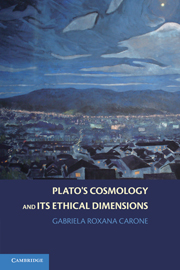Book contents
- Frontmatter
- Contents
- Preface
- Plato's Cosmology and Its Ethical Dimensions
- 1 Introduction
- 2 Demiurgy in the Timaeus
- 3 Cosmic God and Human Reason in the Timaeus
- 4 Creating Mixtures in the Philebus
- 5 Happiness in the Universe of the Philebus
- 6 Reversing the Myth of the Politicus
- 7 Cosmic and Human Drama in the Politicus
- 8 Laws X: First Causes and the Origin of Evil
- 9 Conclusion
- Notes
- Bibliographical References
- Index Locorum
- General Index
5 - Happiness in the Universe of the Philebus
Published online by Cambridge University Press: 10 May 2010
- Frontmatter
- Contents
- Preface
- Plato's Cosmology and Its Ethical Dimensions
- 1 Introduction
- 2 Demiurgy in the Timaeus
- 3 Cosmic God and Human Reason in the Timaeus
- 4 Creating Mixtures in the Philebus
- 5 Happiness in the Universe of the Philebus
- 6 Reversing the Myth of the Politicus
- 7 Cosmic and Human Drama in the Politicus
- 8 Laws X: First Causes and the Origin of Evil
- 9 Conclusion
- Notes
- Bibliographical References
- Index Locorum
- General Index
Summary
In the previous chapter we focused on the metaphysics of the Philebus and its fourfold classification. In this one, I propose to show how those results can be brought to bear on the ethical discussion, which occupies the bulk of the dialogue, about what seem to be two competing lives: the life of intellect and the life of pleasure. In this regard, the roles of both pleasure and knowledge in a happy life deserve further scrutiny, and each will be treated in a separate section. First, if pleasure is one of the main subjects of the Philebus, should we think that it is only by way of compromise that Socrates ends up including it as a component of the happy life? This is a particularly pressing question, given that contemporary interpretations have tended to downplay the role of pleasure in the dialogue (so that Plato, through the mouth of Socrates, is at heart on the side of the intellectualist in the discussion) or even contended that god embodies the ideal of the pleasureless life. In opposition to these readings, I shall argue that in the Philebus Plato does mean to allot pleasure an indispensable role even in the best form of life. Accordingly, if god functions as a model for humans, it is not as an entity who experiences no pleasure but as the ideal of the happiest life understood as one that combines pleasure with knowledge.
- Type
- Chapter
- Information
- Plato's Cosmology and its Ethical Dimensions , pp. 103 - 123Publisher: Cambridge University PressPrint publication year: 2005

